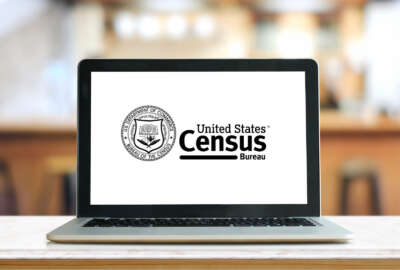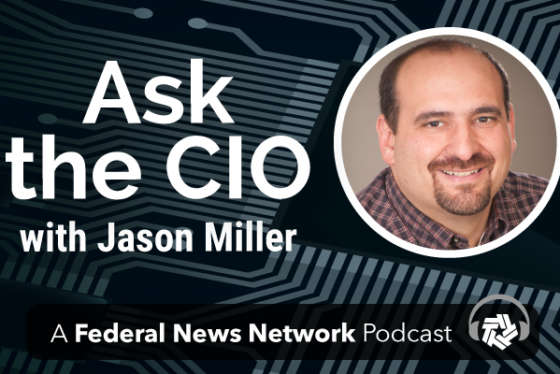Data science is driving major changes to the Bureau of Fiscal Service’s operating model
Justin Marsico, the Treasury Department’s Bureau of the Fiscal Service’s chief data officer, said a pilot program turned into a full-fledged training effort is...
Many agencies tell their employees not to be afraid to ask questions and research answers.
But too often, those same agency leaders don’t provide the tools, training or technology that supports that belief.
Justin Marsico, the Treasury Department’s Bureau of the Fiscal Service’s chief data officer, said a recent pilot program focused on ensuring employees have the necessary skills to ask and answer tough questions, has turned into a full-fledged effort to help solve this long-standing challenge.

The pilot, called 30-days of data science, started in 2021 has now evolved into the Fiscal Data University. It’s about nine months into the first cohort of 40 employees going through the training.
Marsico said the multi-faceted training program, which is intended to develop employees with new data skills and data literacy, is broken up into three parts: Coursework, community building and engagement with the CDO office and actual projects.
“We have recurring check-ins, like office hours style engagements with our office, which is sponsoring this whole thing. Those check-ins allow for us to talk with the students to answer questions, for them to get to know each other and form a little bit of a community,” Marsico said on Ask the CIO. “The second piece of Fiscal Data University that we have right now is a regular check-ins that are scheduled and also ad hoc, as people have questions that come up, they can talk to people on my team. As a part of that, we also have some mentoring that’s going on between more senior analysts and more junior analysts. The final third part of Fiscal Data University is that we asked the participants to go and identify real world analytics use cases that are in their business areas and that need attention. Those are essentially going to become the capstone projects that everybody completes at the end of Fiscal Data University.”
The university participants have logged more than 1,100 hours of training so far and completed more than 14 courses.
Marsico said university participants are focused on their capstone projects where they are trying to solve specific challenges or problems by applying data and analysis.
“We want the cohort participants to have the confidence and the right skills to be able to execute those projects and to go back to their business lines and say, ‘thank you for allowing me to participate in this activity and here’s what I am providing to help our office understand how to improve our operations and programs,” he said.
Training a cross-section of employees
The Fiscal Service opened up the program to anyone interested from across all business lines and at all GS levels.
Marsico said there are employees who work in the transactional business that process payments to those who work in human resources. The grade levels in the cohort range from GS-7 to GS 15s. The approach is similar to the one the Office of Management and Budget undertook in 2021 with its data science upskilling effort.
“It was important for us to get a broad cross section of participants because we’re trying to say that data-informed or data-driven decision making is something that should happen at all parts of our organization. It’s not just the job of the chief data officer. It’s not just the job of the CFO. It’s not just the job of a GS-14, we all need to be thinking in that way. So we wanted to make sure we were getting a good crosscut agency,” he said. “Another broad goal that we have that we’re trying to accomplish with Fiscal Data University is to make sure that our culture at the Fiscal Service is embracing and encouraging data, and the use of data for decision making. In many businesses or government agencies, the use of data is looked at only from a risk perspective, like, there is a risk in taking data out of a system, where it resides and doing something with it because some bad things could happen as a result of it. What we want to do is to make sure that people see the other side of that, the potential value that could be gained by using the data to understand what our customers want, how we can make processes more efficient and to make that decision based on the positives and the risks.”
An added benefit of the university is bringing some standardization to how the fiscal service is training employees on data tools and analysis.
Marsico said the bureau always provided some data related training, but it was on more of an ad hoc basis.
A new community of practice
Marsico added, like many technology challenges, the idea is to change the culture across the agency from the leadership on down.
“Another thing that we are trying to do is to identify some people who can serve as mentors. People who maybe are a little bit more experienced in doing analysis, whether that’s just in general with statistical knowledge, best practices or an expertise within a specific language that we’re focusing on like SQL or Python, or even excel,” he said. “We encourage them to be leaders and to create their own kind of informal groups of people who are trying to learn and improve within those skill sets to go to the people who are either already leaders or aspiring leaders in that area.”
The train-the-trainer approach is helping to make the acceptance and use of data science grow across the fiscal service.
Marsico said the growth and desire for these data skills have led to the creation of an analytics community of practice across the bureau, which is open to any employee or contractor.
“It’s a forum where people who are analysts come in and highlight the work that they’re doing, so that others can get inspired by what they’re taking on, learn from their successes, learn from their failures, learn about what types of tools or techniques they’re using, so that they can reach out and form connections,” he said. “We’ve also seen participation in those community events grow as we’ve pushed Fiscal Data University out. A couple of years ago, we had a couple hundred people participating, but now it can be over 300 attendees that come to our monthly sessions. I think over the long term, the thing that we want to do is to increase the number of analytics that are being deployed, whether those are production analytics that are using data to solve problems or advise us on something like in real systems, or just one off ad hoc analyses where someone asks a research question, uses a thoughtful standard, rigorous methodology comes to an answer and makes that one time decision as a result of that. We just want to see those types of analyses increasing.”
Marsico said the success of the Fiscal Data University is leading the bureau to think about how much larger or how many other cohorts they should run. He said there is an obvious desire for the data skillsets across the workforce so how can the agency meet those desires.
“One of the sources that we’ve looked to for inspiration, as we’ve developed this, has been the Census Bureau. It has something that they developed called econ view, which aims to educate their workforce about some of the basic principles of economics,” he said. “We’ve been seeking to learn about best practices from the statistical agencies to figure out how they apply within our financial agency where data is also very important to us.”
Copyright © 2025 Federal News Network. All rights reserved. This website is not intended for users located within the European Economic Area.
Jason Miller is executive editor of Federal News Network and directs news coverage on the people, policy and programs of the federal government.
Follow @jmillerWFED








